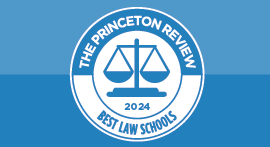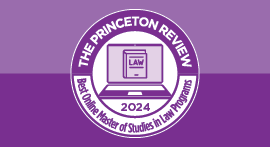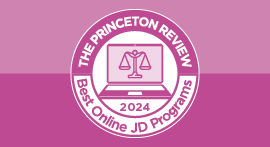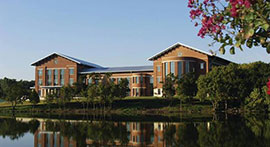From the School
The legal educational experience is changing and Western New England University School of Law is proud to be at the forefront of preparing students to make the most of future opportunities. The School of Law is a forward leaning institution that offers a highly practical and professional approach to legal education.
Western New England University School of Law is an ABA-accredited law school located in the up-and-coming city of Springfield, Massachusetts. We provide our students with a solid foundation in theory strengthened by numerous experiential learning opportunities. As the only law school in western Massachusetts, our students enjoy exceptional access to clinical and externship opportunities in local and federal courts, the region's major employers, legal agencies, and law firms large and small.
Our students graduate with practical skills gained from a highly supportive and personal educational experience that enables them to turn their passions into professions.
Overview
From The School
Each year, the Admissions Committee assembles a talented, interesting, and diverse class of students. Each completed application is read in its entirety and carefully reviewed to determine whether the applicant possesses the academic preparation and motivation necessary to complete the demanding workload of law school. While LSAT scores and undergraduate GPA are important, we recognize that the ability to succeed in law school and contribute to the legal profession are not always tied to these numbers. For that reason, we also closely consider the personal statement, letters of recommendation, and supplemental essays provided by the applicant.
We encourage you to submit your application early since admissions decisions are made on a rolling basis. It is strongly recommended that applications be completed by March 15.
Please visit our website at www.wne.edu/law for more information.
Test Scores
(enrolled students)
Application Process
Other Admission Factors
LSAT Score
Undergraduate GPA
Letters of Recommendation
Essay / Personal Statement
Selectivity Rating
Overall
From The School
Degrees Offered
WNE School of Law realizes that one size does not fit all when it comes to earning your JD. Therefore, in addition to our traditional three-year, full-time program, we also offer four-year, part-time evening and day programs. Furthermore, the School of Law offers several joint degree options: JD/LLM in Elder Law and Estate Planning, JD/MBA, JD/Master of Science in Accounting, JD/ Master of Science in Organizational Leadership, JD/ Master of Science in Sport Leadership and Coaching, JD/ Master of Science in Engineering Management, JD/Master of Regional Planning, and JD/Master of Social Work.
The School of Law also offers a Master of Science in Law for those desiring more legal knowledge, possibly to advance in their current professional field, but not interested in earning a JD and practicing law. Additionally, we offer an online LL.M. in Elder Law and Estate Planning.
Programs and Curriculum
At WNE School of Law, we keep our class size small to promote a collegial learning environment in which students are challenged to actively participate in their legal education. In addition to the typical required courses, the School of Law requires each student to participate in two semesters of legal research and writing courses, a rigorous bar preparation program, and 20 hours of pro bono service. WNE School of Law places heavy emphasis on experiential learning. Students have the opportunity to merge theory with practice through clinical course work, internships and externships, simulation courses, and moot court teams.
To assist students in preparing for their careers, the School of Law offers five areas of concentration: Transactional Law Practice, Criminal Law Practice, Gender and Sexuality Law, International and Comparative Law Practice, Public Interest Practice.
Faculty
Our full-time faculty members have been educated at the nation's most prestigious law schools. All have practiced law before joining our faculty and several hold additional graduate degrees in other disciplines. The School of Law places a strong emphasis on collaborative learning and student-professor interaction. Faculty members foster an open and collegial interaction with the students that provides a positive legal education in a comfortable atmosphere. The School of Law also has numerous adjunct faculty members, including practicing attorneys and judges, who bring their current legal practices into the classroom setting.
Faculty Information
Career overview
Career Services
Graduates Employed by Area
Graduates Employed by Region
Prominent Alumni
Overview
From The School
For the 2020-2021 academic year, tuition for full-time students was $43,424; tuition for part-time students was $32,570. Other costs to take into consideration include books, fees, room and board, transportation, and health insurance. Please see our website for a detailed breakdown of estimated costs.
Financial Aid
WNE School of Law is committed to making a legal education affordable for our students. Over the past three years, an average of 75% of Western New England University law students received scholarships and 90% received some form of financial aid. Scholarships range from $8,000 to full tuition. Law school is an important investment, and we will work with you to assure that you have the resources needed to finance your legal education.
Dates
Expenses per Academic Year
Overall
From The School
WNE School of Law prides itself for its diverse student body. Our students come from various races and ethnicities, ages, academic and professional backgrounds, political affiliations, and geographic areas. There are numerous student organizations including the Women's Law Association, Western New England Law Review, and the Student Bar Association (SBA).
Student Body Profile
Demographics
More Information
Admissions Office Contact
From The School
Campus and Location
Western New England University School of Law is located on WNE's beautiful 215-acre campus in a residential section of Springfield, Massachusetts. With approximately 153,000 residents, Springfield is the third largest city in the Commonwealth and sits in the heart of the Pioneer Valley. There is a wide array of recreational, social, and cultural attractions in the local area as well as easy access to Boston, Albany, New York City, and Hartford.
Facilities
The Blake Law Center has modern classrooms, comfortable student study and social spaces, and a newly renovated Legal Clinic office. The tri-level library houses a collection of over 350,000 volumes along with comprehensive access to numerous electronic resources. The building has a robust wireless network that facilitates research and communication. Law students also have access to most other facilities on campus.
Assistant Dean of Admissions
Springfield, MA 01119


























